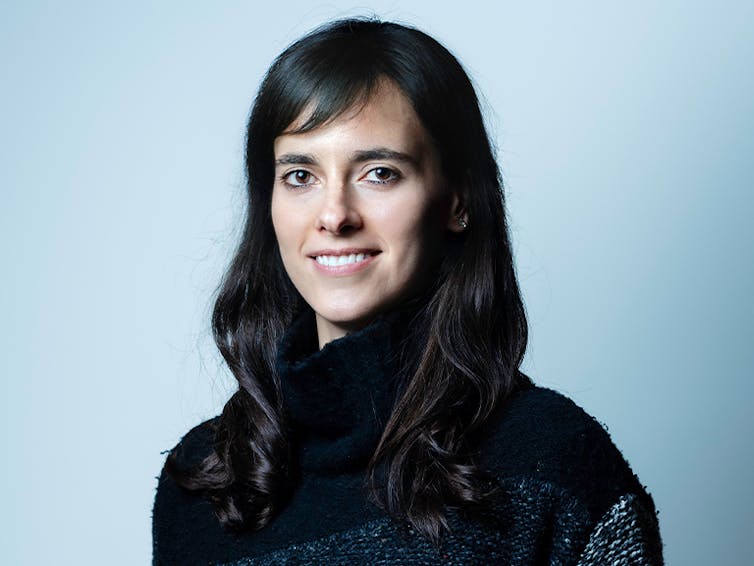Carissa Véliz (UK) says she learns the unspeakable in conversations with her students at Oxford University, with whom she discusses the value of analog, personal relationships, and what makes a good life. She is convinced that only by protecting privacy can we keep democracy safe. And she worries that many young people, accustomed to growing up without it, don’t realize the implications its absence could have for their future.
You’ve mentioned on occasion that privacy is an animal instinct we share with all species, yet lately we live as if we could do without it. Are younger generations aware of its importance?
It’s difficult to answer because “young people” are not a homogeneous group: there are significant differences depending on where they are born, where they live, even whether they are male or female. Lately, I’ve been quite surprised to find that my students are more aware of the importance of privacy and less addicted to technology than many adults. Although perhaps my students are not representative enough of the population.
In general, I’m concerned that there are many children who haven’t grown up with privacy, who can’t even imagine what it’s like to live with privacy, and, above all, who don’t realize the implications its absence has for their future.
Privacy isn’t just a matter of whether or not we allow others to see us or know about us. When companies and governments have access to information about who we are, what we do, whether we are in good or bad health, what our political or religious leanings are, or who we fall in love with, that has implications.
That’s right. Especially because when you’ve always lived in a democracy, it’s hard to imagine that it’s fragile, that it’s vulnerable, that it could come to an end if we don’t take care of it.
The loss of privacy can restrict your freedom—the freedom to speak your mind, the freedom to gather with whomever you choose, the freedom to protest peacefully. When all of that disappears, you begin to fear what you’ve said, or what you might say, and you end up censoring yourself.
This is happening now that in England and the United States, the privacy of those trying to rent an apartment is invaded: landlords hire data companies to obtain information about the potential tenant. And if they reject the tenant, if they deny them access to a home, they don’t have to justify why, they don’t need to give a reason.
Several of the rights enshrined in Article 12 of the Universal Declaration of Human Rights, which proclaims the protection of privacy, family, home, reputation, and so on, are therefore violated.
Of course. And the most worrying thing is that the problems don’t arise at the moment the data is collected, but rather tend to appear much later. What’s more, even when they do arise, it’s not easy to make a direct connection between the moment a piece of data ceases to belong to you and the moment we suffer discrimination or exclusion because of that lost data.
Rights are rights precisely because they are a good that must be protected, essential. And if society lives with an overly individualistic perspective, we risk losing rights and freedoms.
Sometimes it’s the parents themselves who start sharing their children’s information before they can make a decision, without realizing that it could have negative consequences for their children in the future.
Without a doubt. And that makes me think we all need to be better informed, which isn’t easy because many companies and governments aren’t interested in making it known how they handle data.
But we mustn’t make the mistake of placing all the responsibility on the shoulders of individuals, who are overwhelmed by the current level of bureaucracy and workload, and the sheer number of demands our daily lives impose. Ideally, we would have better products, with everyone having access to private email and mobile devices that respect privacy.
The need to try new things and the attraction to risk are inherent to adolescence. But what about digital risks? Are they taken with the same awareness as, for example, skydiving?
Absolutely not. One of the problems with digital life is that it’s so new. We don’t have enough experience to have visceral reactions of fear to the risks we face. Partly because it’s so new, partly because it’s so abstract, and partly because it’s designed to be opaque.
When I write a message that seems private on a platform like X, but is actually visible to everyone, there is an incongruity between what I am actually doing and the feeling I experience.
On the other hand, we are biological beings, and if we jump out of an airplane, the physical sensation of risk is very tangible. But if someone pushes you into the dark web or sells your data to a particularly irresponsible data broker , there’s no physical sensation to alert you.

Can explaining these invisible risks to young people help them set limits?
I think so. I’ve met many students who avoid sharing certain things because they worry about tomorrow, about whether they’ll get into trouble when they apply for a job in the future because someone sees that photo where they’ve had too much to drink, or reads that unfortunate comment.
Above all, I would encourage young people to participate in building their own world. It’s their world, the world they’re going to inhabit, and they have the right to build it. I’d like to see young people who code, dedicated to creating better applications than the ones already available, who don’t want to work for Google but rather want to create their own company, with a different ethic and without racist or sexist biases.
Does digitization imply surveillance?
Not necessarily. The way we’ve designed digital, the two are now inextricably linked. That’s why we need to reinvent digital.
As he puts it, the debate is not about technology yes or technology no, but rather about technology how and, above all, with what ethics.
Indeed, the key is who has power over technology, who controls it, and to what extent it gives us autonomy. An 18-year-old teenager lives in a world where Google has always existed, but the truth is that, if we look at it in perspective, Google has existed for a microsecond in human history. The new generations must realize that everything is temporary, and that they have the opportunity to change what they don’t like.
Many social networks and apps constantly offer us tailored content, and this traps us in a kind of fishbowl, a bubble where only content that matches our way of thinking is shown, while the rest of reality fades away. This makes it easier for hate speech and misinformation to flourish.
Yes, that’s right. But technology doesn’t necessarily have to place us in these information ghettos, hence my insistence that young people themselves invent something different, something less personalized. Because anything personalized isolates us from others.
I insist that we are at a time when it is necessary to get involved in the society we have, to take responsibility for it, to forge it, to cultivate it, to care for it.
And that, I understand, goes beyond creating new technology.
Yes. And while we may make the mistake of thinking that right now, with the rise of artificial intelligence, the most important thing for building the future is the experimental sciences, the reality is that this is the time for the humanities. Because without the humanities, without an understanding of how to govern technology, we could end up worse off than if we didn’t develop that technology.
A little while ago, I read an article in the Financial Times that companies complain that their employees aren’t capable of thinking for themselves. And the disciplines that teach us how to think are, precisely, the humanities.
I don’t know if you’re aware of the recent debate in Spain, with the latest reform of the Education Law, about whether or not to keep Philosophy as a compulsory subject, if it’s useful enough.
That we can even hint that Philosophy isn’t useful shows that we’re dealing with an incredibly superficial, short-term concept of usefulness, focused only on producing and obtaining results that we can quantify, translating into numbers. The truth is, we all have a fairly intuitive understanding that the things that matter most in life can’t be measured.
What message would you send to young people?
I’d send two. The first, that it’s the perfect time to read. Read everything you can read. Read history, read philosophy, read politics, read anthropology, learn from past generations, from how they overcame the most difficult moments of their lives. And read on paper, because the act of reading is an act of defiance of everything that’s happening. I mean: no, I’m not going to be on your computer, nor am I going to be on your social media, I’m going to read the great thinkers of history.
The second: that life isn’t digital, but analog… Life is the life of things, of the corner coffee shop, the life of your friends, of in-person conversations, of nature, of going for a run. And the less we depend on digital, the more robust and satisfying that life will be. Digital is a ghost of analog, a second best , what we use when we don’t have the option of doing something analog. We talk on Zoom when we can’t meet in person.

Researcher, Uehiro Center for Practical Ethics, University of Oxford
This interview was originally published in the Telefónica Foundation’s Telos Magazine and is part of a special issue dedicated to the Alphabet Generation .